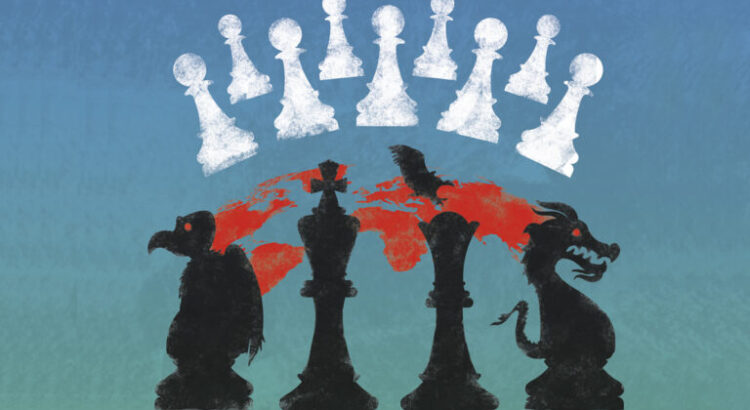Translated by Marvin Najarro
In 2015 it was Guatemala, demonstrating against corruption on sunny Saturdays. Latin America was amazed to see the submissive and “chambona” Guatemalan society finally rising up after having elected a genocidal as president; they did not protest demanding justice for the victims of the genocide that they denied it took place, but against corruption. But it is better than nothing, given the circumstances of a very weak historical memory. They allowed themselves to be tricked, as in soccer “chilena” goal, when Jimmy Morales was made president, and after that, they by their own volition headed for the slaughterhouse voting for Giammattei, a president as disastrous as the others before him. It was there that all the noise of the great Guatemalan dignity, that the mestizo protesters proclaimed, came to an end, because the indigenous peoples remained in the struggle without taking a step back.
In 2019 it was in Ecuador, when the people came out to demonstrate against the gasoline subsidy, and against austerity measures signed by Lenin Moreno. The people poured out into the streets, and for 10 consecutive days the government beat them hard, right and left; massacre after massacre. The people backed off when they were told, it’s okay, take it easy, we are going to eliminate that measure, but one way or another we are going to screw you over: the people accepted. But it did not matter the spilled blood of the slaughtered, they ended up voting for the continuity of the dictatorship they silently had endorsed.
In Chile, it was the youth who took the lead jumping the subway bars as a show of rebellion against the abusive fare hike decreed by the government, also in 2019. Those who followed them grabbed the momentum while the older adults who lived through the dictatorship watched them in astonishment, what nobody never thought was happening in bloodied Chile, where fascism began to unravel Latin America. A day turned into weeks and then into months, the people took to the streets, and the dignity and the power of the historical memory made an appearance in every corner of the country. There were the martyrs, the disappeared, the survivors along with the new seed that emerged from the depths of the earth: Chile taught Latin America and the world a lesson. Where there’s a will there’s a way. Then came the pandemic, and there the flower died. But the memory of the social unrest remained as well as the change of name from Plaza Baquedano, or Plaza Italia, to Plaza de la Dignidad; and as a footnote of that time, the postcard of a black dog with a red handkerchief around his neck. Hopefully the Chilean people are only building momentum and have not backed down hindering themselves again.
The pandemic is a weapon of war used by the neoliberal governments against the poor peoples.
Colombia wanted to shake off the drowsiness, because in Latin America it is the country where post-dictatorship strategies began with Plan Colombia that spread throughout neoliberal Latin America, with different names depending on the season; Colombia that hurts us so much. In 2019, a series of demonstrations against the government were also organized due to the implementation of economic measures that the State planned to impale the people with, and which the government ended up imposing on them anyway. Now, why did Colombia not sign for “La Paz”, what is in the mind of that society? We also know that “La Paz” is nothing more than a piece of paper, as in the case of Guatemala that also signed for “La Paz”. But the former guerrillas who turned over their weapons have being killed one by one by the same people who have massacred entire communities, robed their lands, and forced others to migrate. They have killed dozens of social activist, and environmental defenders, and have executed social cleansings in poor neighborhoods; however none of this has provoked the Colombian people to wake up stirred by the pain and the anger of seeing their people die at the hands of cowardly paramilitaries. And then a tax reform spurs them to rise up? Seriously? Given Latin America history of the last decades it is fitting to say that it is better than nothing.
The protests of the past in Colombia, Chile, and Ecuador resulted in the assassination and disappearance of protesters; women were sexually abused by the military and the police. The dictatorships violence of yore taken to another level under the eyes of the world and all existing media. Fascism is not afraid of anything neither are neoliberal oligarchies. What are the people afraid of if they have been left with nothing? Guatemala, El Salvador, Honduras, Colombia, Ecuador, Chile, all of them with neoliberal governments, but the mainstream media keep telling us that it is in Cuba and Venezuela where dictatorships are being experienced. Is it not high time for Latin America to wake up and organize an indefinite general strike that will expel the oligarchies from their position of power in order to forge the Patria Grande once and for all? It is time to be humble, to listen and be part of the strength, dignity, and courage of the indigenous peoples.
We commend the Colmbian people’s awakening, and hopefully this will be the beginning of the end of the dictatorship, and a new Colombia brimming with passion fruit flowers may arise.
Fuente: https://cronicasdeunainquilina.com







 Users Today : 95
Users Today : 95 Total Users : 35459561
Total Users : 35459561 Views Today : 152
Views Today : 152 Total views : 3417910
Total views : 3417910